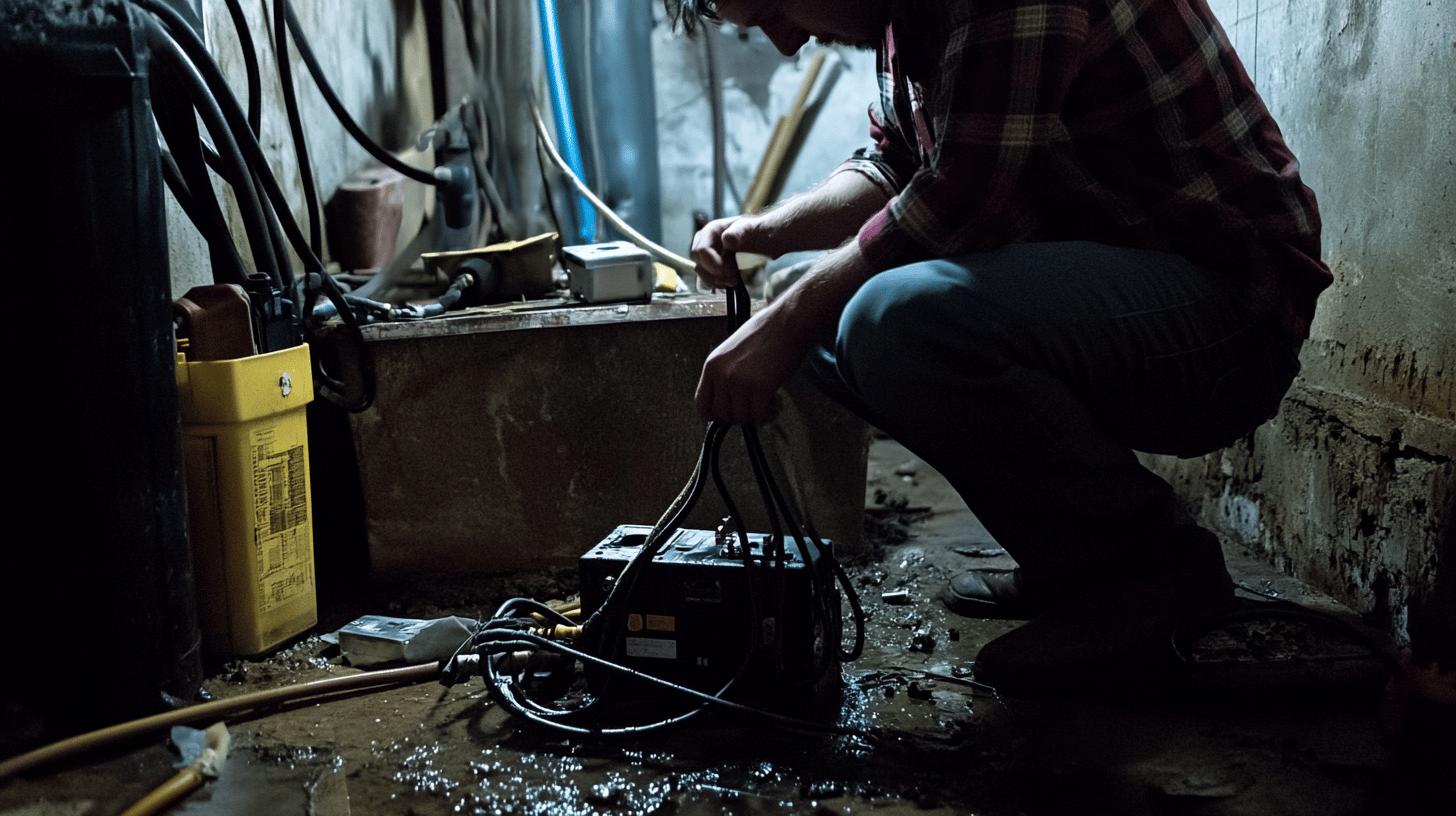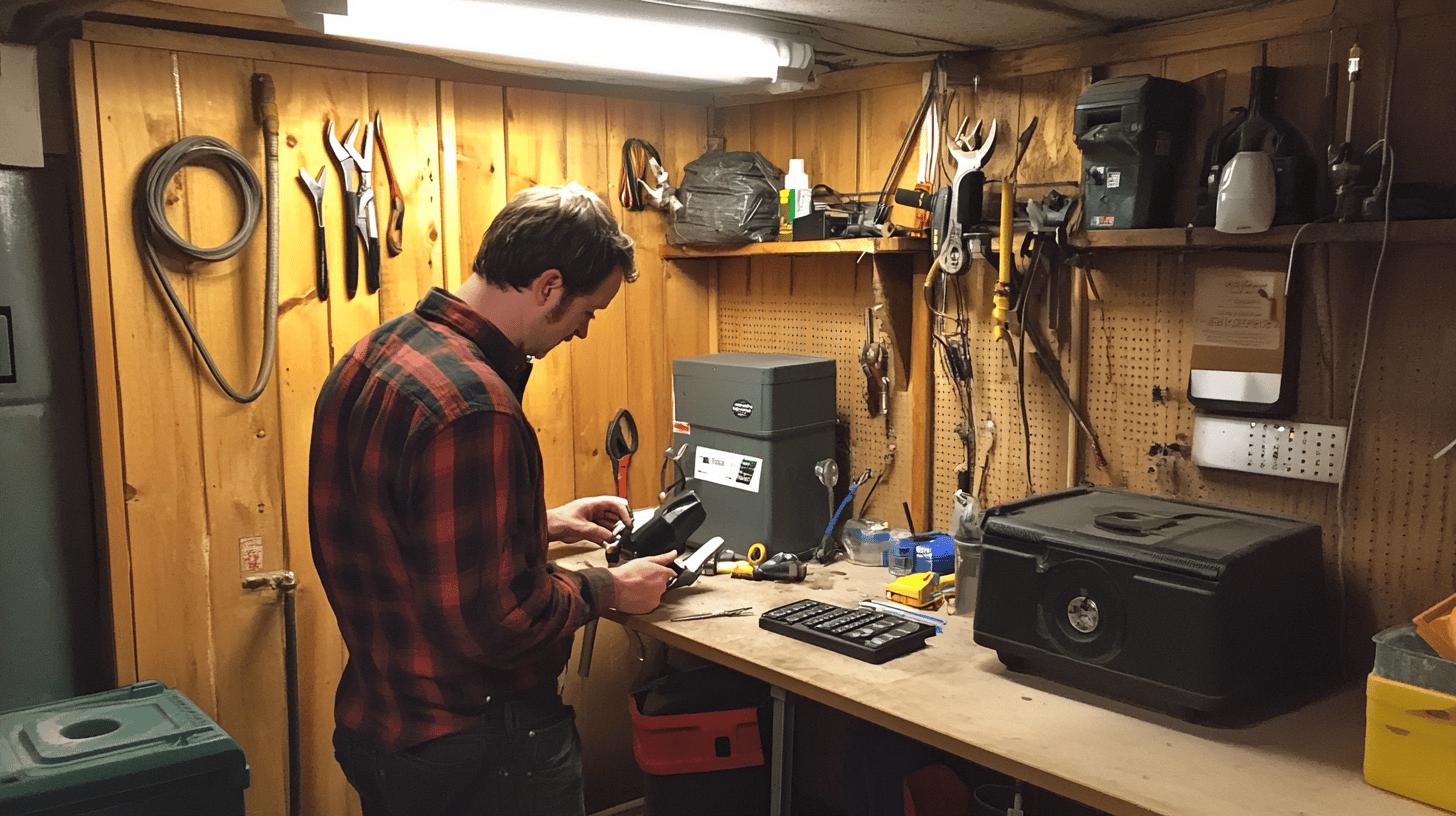TL;DR:
- Common Sump Pump Failures: Power outages, clogged discharge lines, switch malfunctions, improper installation, and lack of maintenance.
- Signs of Issues: Unusual noises, irregular cycling, and power supply problems.
- Troubleshooting Steps: Inspect for blockages, check electrical connections, ensure proper switch function.
- Preventive Maintenance: Remove debris, test the system, inspect discharge line and float switch, verify pump size.
- Power Outage Risks: 40% of failures due to outages; consider battery backups, generators, water-powered pumps, alarms, and surge protectors.
- Professional Service Benefits: Expert advice, routine inspections, system integration, and cost savings through early detection.
Could your sump pump fail when you need it most? Many homeowners don’t realize that skipping routine maintenance or having it installed wrong can lead to problems. With over 60% of homes likely to deal with underground water damage, a broken sump pump could cause serious trouble. Understanding why sump pumps fail can help you avoid these issues and protect your home. Let’s go over the common reasons for sump pump failures so your system works when it matters most.
Common Reasons for Sump Pump Failure
Knowing why a sump pump might fail is important to keep your home safe from water damage. Sump pumps help keep basements dry, but they can run into problems that cause them to stop working. Here are the most common reasons a sump pump might fail:
- Power Outages: Sump pumps need electricity to run. If the power goes out during a storm, the pump stops working, which puts your home at risk.
- Clogged Discharge Lines: Debris and sediment can block these pipes. This blockage forces the pump to work harder or even shut down.
- Switch Malfunctions: The float switch starts and stops the pump. If it gets stuck or tangled, the pump won’t work properly.
- Improper Installation: If not installed correctly, the pump might not activate or remove water effectively.
- Homeowner Negligence: Skipping routine maintenance can hide problems that eventually lead to failure.
Regular maintenance and professional checkups are key to preventing sump pump failures. By regularly inspecting and cleaning your pump, you can make it last longer. Professional plumbers can catch problems early and give expert advice, helping you avoid expensive repairs and water damage.
Troubleshooting and Identifying Sump Pump Issues

Catching sump pump problems early is crucial to avoid water damage. Taking action when you notice warning signs can save you money and protect your home’s foundation.
Unusual Noises and Irregular Cycling
Strange noises or irregular cycling are often signs of sump pump problems. Noises could mean mechanical wear or debris in the impeller, while frequent cycling without removing water might signal a bad switch or check valve. To fix these issues, check for blockages, clean out debris, and listen for noise sources so you can replace any worn parts.
Inspecting the Float Switch
The float switch controls when the sump pump turns on. If it gets stuck or tangled, the pump can stop working, which could lead to flooding. Make sure the switch moves freely, clear away any debris, and adjust it if needed. Regularly testing the switch can help prevent sudden failures.
Power Supply and Electrical Checks
A stable power supply is essential for your sump pump to work properly. Check for tripped breakers or blown fuses, and make sure the pump is plugged in and the outlet is functioning. If you often experience power outages, think about getting a battery backup to keep the pump running during those times.
| Issue | Signs | Troubleshooting |
|——-|——-|——————|
| Unusual Noises | Mechanical wear, debris in impeller | Inspect for obstructions, replace worn parts |
| Irregular Cycling | Frequent on/off without water removal | Check switch or valve, clear debris, adjust settings |
| Power Supply Issues | Tripped breakers, non-working outlet | Test connections, consider battery backup |
Noticing these signs and troubleshooting them quickly can help prevent pump malfunctions. Dealing with issues right away reduces potential damage and keeps your sump pump reliable.
Preventing Sump Pump Failures with Proper Maintenance
Routine maintenance keeps your sump pump running longer and helps prevent failures. Regular checks can catch problems early, which saves you money on costly repairs and protects your home from water damage.
Here’s how to keep your sump pump in good shape:
- Remove Debris: Keep the sump pit clear of debris that could block the pump or switch.
- Test the System: Pour water into the pit to ensure the pump activates and deactivates properly.
- Check the Discharge Line: Ensure it’s clear and directs water away from the foundation.
- Inspect the Float Switch: Ensure it moves freely without blockages.
- Verify the Pump Size: Make sure the pump size fits your home’s needs to avoid overworking.
- Examine Electrical Connections: Check the power source and secure all connections.
- Clean the Pump Inlet Screen: Regularly clean it to avoid clogs.
Hiring professionals for regular inspections comes with many benefits. They offer maintenance plans to keep the pump running efficiently and use their expertise to prevent major issues, saving you both stress and money. Regular service also helps extend the life of your pump.
Understanding the Role of Power Outages in Sump Pump Failure

Power outages are responsible for about 40% of sump pump failures. During storms, this puts your basement at risk of flooding since the pump can’t remove water. To prevent failures during outages, think about backup systems:
- Battery Backup Systems: Provide temporary power so the pump runs during outages.
- Generators: Automatically power the pump if electricity fails.
- Water-Powered Backup Pumps: Use water pressure, not electricity, to operate during power cuts.
- Alarm Systems: Alert you to problems, allowing for quick action.
- Surge Protectors: Guard against electrical surges when power returns.
Adding these systems increases your pump’s reliability. Backup solutions give you peace of mind by keeping your home safe from water damage during power outages.
Benefits of Professional Plumbing Services for Sump Pump Reliability
Professional plumbers offer expertise and reliability for sump pump installations and repairs. Many failures come from improper installation and lack of maintenance. Plumbers make sure your sump pump is installed and maintained correctly, which helps reduce these risks.
Key benefits of hiring pros for sump pump services include:
- Expert Advice on Upgrades: Plumbers suggest and perform upgrades to improve efficiency.
- Routine Inspections: Regular checks catch early signs of issues, preventing bigger problems.
- System Integration: They seamlessly integrate the pump with your plumbing for optimal performance.
- Reduced Repair Costs: Early detection and maintenance minimize expensive repairs or replacements.
Professional plumbing services are cost-effective over time. By preventing failures and extending your pump’s lifespan, they save you money and stress. Regular inspections ensure your sump pump remains a reliable defense against flooding, giving you peace of mind and protecting your home.
Final Words
Understanding what causes sump pump failures is essential for keeping your home dry and safe. By recognizing mechanical problems, improper installations, and power-related issues, you now have the knowledge to ensure your sump pump works reliably. Regular maintenance and catching issues early are key to preventing common sump pump problems. Think about hiring professional plumbing services, as they have the expertise to tackle complex pump issues and enhance system reliability. With these strategies, you can effectively protect your home from potential water damage.
FAQ
What is the common reason for sump pump failure in the basement?
A common reason for sump pump failure is power outages. Other issues include clogged discharge lines, switch malfunctions, and improper installation. Routine maintenance helps prevent these failures.
Who should you call for sump pump issues?
For sump pump issues, contact a licensed plumber experienced in diagnosing and repairing pump malfunctions. Professionals can efficiently address problems, ensuring your pump functions properly.
How can you diagnose sump pump problems?
Diagnosing sump pump problems involves checking for blockages, inspecting the float switch, and testing the power supply. Unusual noises, irregular cycling, and rust are warning signs of failure.
Can sump pump failure lead to insurance claims?
Sump pump failure may be covered by home insurance, but it varies by policy. Review your policy or speak with your insurance provider to understand your specific coverage terms.
What are the consequences of a sump pump failure?
A sump pump failure can lead to basement flooding, causing potential water damage. Prompt repairs and regular maintenance can mitigate these risks.
Why might a sump pump be dry after heavy rain?
A dry sump pump after heavy rain could indicate a blockage or improper installation preventing water from entering the sump pit. Inspect and clear blockages promptly to restore flow.
Can you shower if your sump pump is not working?
Showering when the sump pump is not working can risk water backup if your drainage system relies on it. Address pump issues promptly to avoid complications.
Why does the sump pump drain and fill back up?
A sump pump draining and filling back up could be due to a short cycling issue or water continuing to enter the sump pit. Check for switch problems or excessive water inflow.
What is a common defect in a sump pump?
A common defect in sump pumps is switch malfunction. This can cause irregular cycling or prevent the pump from turning on, leading to possible flooding.
What is the normal life expectancy of a sump pump?
The normal life expectancy of a sump pump is about 7 to 10 years, depending on usage and maintenance. Regular care can extend a pump’s operational lifespan.
How do you prevent sump pump failure?
Prevent sump pump failure by performing regular maintenance. Clean the pump, test it periodically, and ensure it is correctly sized and installed. Consider professional inspections.
Is a sump pump failure covered by insurance?
Insurance coverage for sump pump failure depends on your policy terms. Some might cover specific water damage types. Contact your provider for precise details on coverage.

